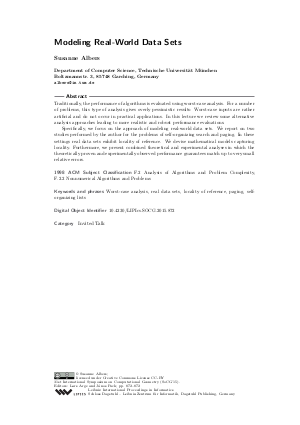Modeling Real-World Data Sets (Invited Talk)
Author Susanne Albers
-
Part of:
Volume:
31st International Symposium on Computational Geometry (SoCG 2015)
Part of: Series: Leibniz International Proceedings in Informatics (LIPIcs)
Part of: Conference: Symposium on Computational Geometry (SoCG) - License:
 Creative Commons Attribution 3.0 Unported license
Creative Commons Attribution 3.0 Unported license
- Publication Date: 2015-06-12
File

PDF
LIPIcs.SOCG.2015.872.pdf
- Filesize: 202 kB
- 1 pages
Document Identifiers
Subject Classification
Keywords
- Worst-case analysis
- real data sets
- locality of reference
- paging
- self-organizing lists
Metrics
- Access Statistics
-
Total Accesses (updated on a weekly basis)
0Document
0Metadata
Abstract
Traditionally, the performance of algorithms is evaluated using worst-case analysis. For a number of problems, this type of analysis gives overly pessimistic results: Worst-case inputs are rather artificial and do not occur in practical applications. In this lecture we review some alternative analysis approaches leading to more realistic and robust performance evaluations. Specifically, we focus on the approach of modeling real-world data sets. We report on two studies performed by the author for the problems of self-organizing search and paging. In these settings real data sets exhibit locality of reference. We devise mathematical models capturing locality. Furthermore, we present combined theoretical and experimental analyses in which the theoretically proven and experimentally observed performance guarantees match up to very small relative errors.
Cite As Get BibTex
Susanne Albers. Modeling Real-World Data Sets (Invited Talk). In 31st International Symposium on Computational Geometry (SoCG 2015). Leibniz International Proceedings in Informatics (LIPIcs), Volume 34, p. 872, Schloss Dagstuhl – Leibniz-Zentrum für Informatik (2015)
https://doi.org/10.4230/LIPIcs.SOCG.2015.872
BibTex
@InProceedings{albers:LIPIcs.SOCG.2015.872,
author = {Albers, Susanne},
title = {{Modeling Real-World Data Sets}},
booktitle = {31st International Symposium on Computational Geometry (SoCG 2015)},
pages = {872--872},
series = {Leibniz International Proceedings in Informatics (LIPIcs)},
ISBN = {978-3-939897-83-5},
ISSN = {1868-8969},
year = {2015},
volume = {34},
editor = {Arge, Lars and Pach, J\'{a}nos},
publisher = {Schloss Dagstuhl -- Leibniz-Zentrum f{\"u}r Informatik},
address = {Dagstuhl, Germany},
URL = {https://drops.dagstuhl.de/entities/document/10.4230/LIPIcs.SOCG.2015.872},
URN = {urn:nbn:de:0030-drops-50865},
doi = {10.4230/LIPIcs.SOCG.2015.872},
annote = {Keywords: Worst-case analysis, real data sets, locality of reference, paging, self-organizing lists}
}
